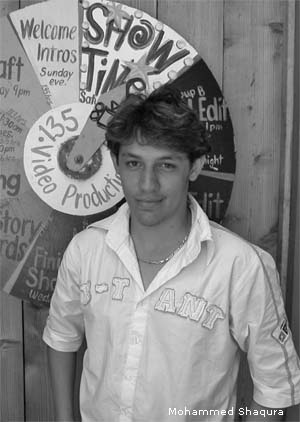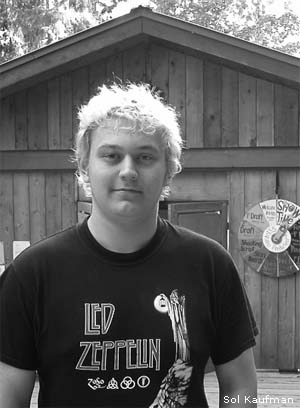The Kids in the Forest
Israelis and Palestinians make films on Canadian soil
By Grant Shilling
An Israeli, Palestinian and Canadian meet in the wilderness in Canada. It may sound like the set up to a bad joke, but that is exactly what happened at the Peace It Together Camp at the Gulf Islands Film and Television School [GIFTS] on Galiano Island, BC this past August. Thirty youth from Palestine, Israel and Canada gathered at the school located in an old growth forest on the site of a former logging camp.
Call them the Kids in the Forest.
“It feels like we are the first settlers,” says Mohammad Shaqura, 17, nervously staring out at the dense rainforest that surrounds him. His comment is greeted with much laughter from the youthful crew seated at picnic tables amongst the Atco trailers that house the students. Hebrew, Arabic and English flow through the campsite.
Galiano Island, population 1,000, is a 50-minute ferry ride and worlds away from the mainland and its one-hour bus ride to downtown Vancouver. The school prides itself as a rural retreat.
“No I’m serious. I’m from Bethlehem we walk elbow-to-elbow on the street in crowds. I like crowds. Even Vancouver it has, what two, three million people? No crowds,” says Shaqura exasperated and to more laughter.
Shaqura may be onto something; he is a settler–on the peace frontier. A place where the Wild West meets the Middle East. And yes, bring your sense of humour you are going to need it.
The groups got together during the intense battles between Israel and Lebanon this past summer.
At first there were concerns that many of the Palestinians in the occupied territories would not be able to make it to the camp. Fortunately they all found passage through Jordan.
“As violence escalates, people become more polarized and more emotional,” says Reena Lazar, a Jewish-Canadian and an executive director of Creative Peace Network seated amongst a group of students. “This, of course is the exact opposite of what is needed. While our program is unlikely to solve the current crisis, it will give the participants the unique opportunity to work through their fear and anger in a safe environment and with the very people to whom their feelings are directed.”
Direct comments were tossed like katuysha rockets, regularly and passionately in group circles where all issues and feelings about the “other” were on the table.
Feelings, as a result of the talking circles, were raw, and still, a film had to be made. Getting a film done in six days from script to screen is hard work. God, apparently, only had seven.
“The goals of those talks is to collaborate and look at causes as opposed to consequences. The other side is as human as you are and what they do is a product of their feelings,” says Sol Kaufman, 17, who goes to King David High–a Jewish private school in Vancouver–and hopes to be a journalist.
Kaufman has very specific ideas about the role of the Canadian contingent at the film school. “We are here mainly to mediate and be unbiased third person observers.”
GIFTS has previously hosted and performed everyday hands-on miracles with projects for First Nations and Autistic youth, persons with HIV and sex trade workers, so a group from the Holy Land seemed natural.
Has meeting Palestinians in this context changed Kaufman’s opinions about the conflict?
“In some ways, mostly not. The Palestinians sometimes use media to turn public opinion over to their side. Having the goal to be unbiased is hard when you are being deliberately manipulated. More strict rules have to be set up before they get their chance to push their agenda.”
Is that censorship?
“You could spend all your time accusing the other side of wrong doing. You won’t go forward by making accusations, in fact you will be inflaming things and that is contrary to the goal of a peaceful equilibrium.”
Intelligent, sensitive and potentially very angry Mohammed Shaqura works “in theatre and the arts” he explains in English (one of the requirements of the camp was the applicants had to speak English). In Bethlehem Shaqura spends much time on the computer, smokes the hubbly bubbly and walks around town a lot. There is a caged restlessness to him.
For Shaqura what does the camp offer?
“The Israelis here [at GIFTS] treat me like a human, we are all the same age, so we became friends quickly. But one day I will meet them at the checkpoints, because they will serve in the army, and I don’t know how they will treat me,” he says.
“We know more about them and they know more about us–not a lot though. Nobody can know how we have to live in Palestine. The Israeli soldiers, they think they are heroes, but they don’t realize they are monsters with us.
“They wish not to treat us with humanity. They want to put pressure on us to accept anything. They want us out of Israel.”
Shaqura has no expectations of the camp. “Millions and millions of people can’t make peace? How can we?”
“Teenagers are more recruits than power brokers,” adds Kaufman.
Shaqura plays the lead in a Romeo and Juliet tale called No Place for Dreamers a video exploration of a romantic relationship between a Palestinian man and an Israeli woman. Using visual glimpses into their relationship, the film addresses issues in the current Israeli-Palestinian conflict. I ask Shaqura what he thinks of the film: “Nice idea,” he says skeptically.
In the making of the video Palestinians played the role of Israeli soldiers and the Israelis played the role of Palestinian civilians.
“It was very realistic,” says Inbar Sofri, 17, an Israeli student from Jerusalem.
“Not really,” says Razan, a Palestinian girl.
Peace here is in a bubble, most participants won’t be able to see each other once back in Israel and the Occupied Territories (although some of the camp participants have been messaging each other since the camp). This sentiment is captured well in the video Caped In The Mist a short dramatic film about Israeli and Palestinian youth coexisting peacefully on a secluded island. They live in blissful ignorance until a shipwrecked teenager arrives to reveal the historical conflict between their peoples and history repeats itself.
Razan Abdel, 17, and Nadov Dan Goor, 16, sit at picnic table where Dan Goor is gleefully painting his gumboots. Abdel, a Christian Palestinian from Ramallah and Dan Goor, a high school student from Jerusalem were fiercely opposed to each other during the talking circles. Now it appears a romance is brewing.
Abdel says she envisions meeting Dan Goor at a checkpoint one day where he will be a soldier and says: “I don’t know if I’m going to hug him or beat the shit out of him.”
Dan Goor seems stung by the suggestion. “No you will hug me,” he says, hurt.
Abdel seems less sure. Then she tells a story:
“In Ramallah we had to move out of the house we lived in. It was destroyed by the army and we were going back there to get some things. An Israeli soldier was chasing a young Palestinian boy through our bombed out house and he shot and killed the boy. The Israeli soldier turned around to another Israeli soldier and he was crying and the soldier was hugging him. I was supposed to go crazy for the dead boy. But I too was crying for the soldier.”
Inbar Sofri, 17, is an Israeli from Jerusalem, going into grade 12. These days she spends a lot of time at home. “It is scary when there is something that might happen. It’s better to stay at home. I never go on buses.” Sofri has no Palestinian friends but some Israeli-Arab friends. She displays all the naiveté and comfort of your average suburban Canadian kid.
What does she hope for?
“That people won’t be afraid to do whatever they want to do,” she says tears filling her eyes.
David Ozier, a GIFTS mentor and one of its founders who has joined our table pulls us into the “nerd hole” a subterranean editing suite. We squish in with a few other students and listen to the heartbreaking words of Haneen Abu-Libdeh as part of the film that will become Sweeter than Chocolate:
“There’s always this fear,” says Abu-Libdeh to the camera.” It’s not fear anymore…it’s a part of me. A part of who I am. A part of every day. So I don’t consider it fear. It’s a part of what happens every day. The fear of not surviving. The fear of not succeeding. The fear of not living and losing someone. Maybe being bombed. Maybe being murdered.
“For the Palestinians there’s always this kind of fear no matter how hard you try to break away from it. It just grabs onto you. I don’t remember anytime I had no fear.”
Velcrow Ripper, a documentary filmmaker and the winner of two Genies (ScaredSacred and Bones of the Forest, which he and the artist Heather Frise made in a cabin in the woods just behind the school) mentored at the Peace It Together Camp. “Canadians make fun of the fact that we are stereotypically considered ‘polite’ and ‘nice’,” he says. “But peace is a gift that we have to offer the world.”


